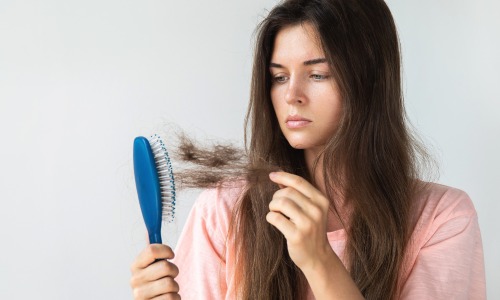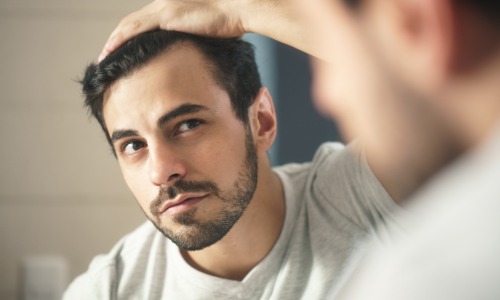Hair Diseases
Understanding Hair Problems: Causes, Types, and Treatments
Hair Loss
Hair loss, also known as alopecia, can occur for various reasons and affects both men and women. Here’s an overview of the common causes, types, and treatments:
Common Causes of Hair Loss:
- Genetics (Androgenetic Alopecia): The most common cause, especially in men (male pattern baldness) and women (female pattern hair loss).
- Hormonal Changes: Conditions like pregnancy, childbirth, menopause, and thyroid issues can lead to hair loss.
- Medical Conditions: Such as alopecia areata (an autoimmune disorder), scalp infections, or trichotillomania (hair-pulling disorder).
- Medications: Drugs used for cancer, arthritis, depression, heart problems, and high blood pressure can cause hair loss.
- Nutritional Deficiencies: Lack of essential nutrients, like iron or protein, can contribute to hair thinning.
- Stress: Physical or emotional stress can trigger temporary hair loss.
Hairstyles and Treatments: Tight hairstyles or chemical treatments can lead to traction alopecia.

Types of Hair Loss:
- Androgenetic Alopecia: A hereditary condition leading to thinning hair or baldness.
- Alopecia Areata: An autoimmune condition where the immune system attacks hair follicles, causing patches of hair loss.
- Telogen Effluvium: Temporary hair loss due to stress, illness, or hormonal changes.
- Traction Alopecia: Hair loss caused by tight hairstyles pulling on the hair over time.

Androgenetic alopecia male and female pattern baldness :
Androgenetic alopecia, commonly referred to as male or female pattern baldness, is the most common type of hair loss, affecting a significant portion of the population. Here’s an in-depth look at this condition:

Causes:
- Genetics: The condition is hereditary, meaning it’s passed down from your parents. If you have family members with androgenetic alopecia, you’re more likely to develop it.
- Hormones: The condition is linked to androgens, which are male hormones like testosterone. In androgenetic alopecia, hair follicles become sensitive to dihydrotestosterone (DHT), a derivative of testosterone, leading to follicle shrinkage, shorter hair growth cycles, and eventually, hair thinning.
Patterns of Hair Loss:
- In Men:
- It often starts with a receding hairline at the temples and thinning at the crown, eventually leading to a characteristic “M” shape or complete baldness at the top of the head.
- In Women:
- Hair loss usually presents as a general thinning across the scalp, with the hairline typically remaining intact. A widening part is often noticed, and severe cases may lead to thinning over the entire scalp.

Stages of Androgenetic Alopecia:
- Men: The Hamilton-Norwood scale classifies the stages from slight thinning at the temples to complete baldness.
Women: The Ludwig scale is used to classify the degree of hair loss, ranging from mild thinning to significant thinning .If you are looking for best homeopathy doctor in Bangalore
Diagnosis:
Diagnosis is usually made through a combination of medical history, examination of the scalp, and sometimes, a scalp biopsy or blood tests to rule out other causes of hair loss.
Treatment
Hair fall can be distressing and confidence shaking experience, but homeopathy offers a natural and effective approach to promote hair growth, strengthen hair follicles and address underlying causes.
By addressing hormonal imbalance, nutritional deficiencies and stress, homeopathic med will help to reduce hair fall, promotes new hair growth, improve hair texture and strength.
Homeopathic medicines like wies , thuja, nat mur , phos are some of the common homeopathic medicines used for male pattern and female pattern baldness, there are huge number of medicines used according to different causes.
Alopecia Areata
Alopecia areata is an autoimmune disorder that causes sudden hair loss in small, round patches on the scalp and other areas of the body.
What is Alopecia Areata?
Alopecia areata is a condition where the immune system mistakenly attacks hair follicles, leading to hair loss. The exact cause of this immune response is not fully understood, but it is believed to involve a combination of genetic and environmental factors.homeopathy doctor in Bangalore
Causes:
- Autoimmune Reaction: The body’s immune system targets hair follicles, which leads to hair loss. The specific trigger for this autoimmune response is unknown.
- Genetics: There is a hereditary component, as individuals with a family history of autoimmune diseases or alopecia areata are more likely to develop the condition.
- Environmental Factors: Stress, infections, and other environmental factors might trigger or exacerbate the condition, though the relationship is not fully clear.homeopathy doctor in Bangalore

Types of Alopecia Areata:
- Alopecia Areata: The most common form, characterized by one or more small, round, smooth patches of hair loss on the scalp or other parts of the body.
- Alopecia Totalis: A more severe form, leading to complete hair loss on the scalp.
- Alopecia Universalis: The most severe form, resulting in the complete loss of hair on the scalp and body, including eyebrows, eyelashes, and other body hair.
- Alopecia barbae:This condition affects the beard region

Symptoms:
- Patchy Hair Loss: The primary symptom is the sudden appearance of round, smooth patches of hair loss on the scalp or other parts of the body.
- Nail Changes: Some individuals with alopecia areata may notice pitting, ridging, or other changes in their nails.
- Itching or Burning: Before hair loss occurs, some people may experience tingling, itching, or burning in the affected areas.homeopathy doctor in Bangalore
Treatment
Coping with alopecia areata can be challenging due to the emotional and psychological impact of sudden hair loss. Seeking support from homeopathic dr can help manage the condition’s effects on daily life.
There are many homeopathic medicines used, mainly used are Acid flour, calc phos, nat mur, these med will help to stimulate hair growth in bald patches ,reduce inflammation and auto immune response ,improve over health and well being .
But a detailed case taking with mental emotional physical modalities will help to understand the case in deep to understand the root cause and treat the patient with different causes.A tailored remedy is planned to address your unique needs.
Mesotherapy
Mesotherapy is a hair treatment performed by a skilled professional. It involves administering tiny injections that deliver a blend of vitamins and nutrients essential for promoting healthy hair and stimulating growth. The specific formula used is determined by the doctor based on the individual's hair concerns.
